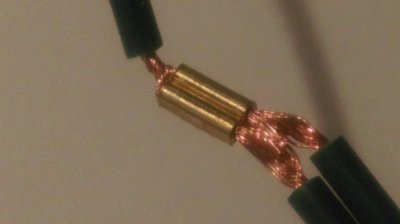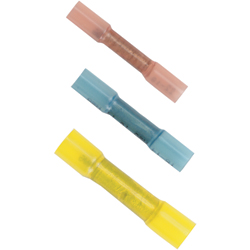we use seamless butt connectors and on things outside exposed to the elements, solder and heat shrink.
i was planning on doing a write up on connectors, but i will explain here.
in every connection in every vehicle is a plug. in that plug are wires. those wires have either a male end or a female end. guess what? those oem connectors are crimped on. a good seamless butt connector is perfectly fine, because you are crimping the wire. a little different than what auto manufacturers do, but its a crimp none the less. if you look at your vehicle, the only solder you will find are on circuit boards.
we solder connections on the outside of a vehicle because the heatshrink allows for a watertight seal. where the oem still uses a crimp style connection, they are in a waterproof housing.
there had been an ongoing debate on crimps vs solder. claims have been made that crimps cause too much resistance in sensitive connections. my thought? heating a wire with solder to 800 degrees to make a connection does no more good or damage than a good crimp style connector. for a vehicle application, there is no difference. one of my former employees now works for att and in that aspect, the cat5 and 6 and rj45 are all crimped on with a t tap style connection. however some connections have to be made within certain parameters using a highly sensitive meter. something we would never use in a vehicle. we arent transferring data, just raw electrical signals.
t taps and scotch locks will work if you have the right sized part, however, we do not recommend them for the following reasons.
vibrations can lead to a loose connection. since we expose our trucks to a lot of different terrain, using one of these connections could fail. in high current situations you will generate a lot of heat due to the fact that these do not have a lot of contact. and now in these newer vehicles, the wires are getting thinner and thinner. there arent small enough connectors to attach to that small of wire.
im sure this will stir up some more debate, but as someone who has dealt with vehicle wiring for 15 years, it is the conclusion i have come up with.




